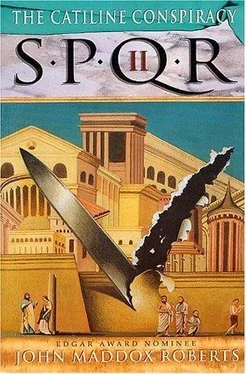John Roberts - The Catiline Conspiracy
Здесь есть возможность читать онлайн «John Roberts - The Catiline Conspiracy» весь текст электронной книги совершенно бесплатно (целиком полную версию без сокращений). В некоторых случаях можно слушать аудио, скачать через торрент в формате fb2 и присутствует краткое содержание. Жанр: Исторический детектив, на английском языке. Описание произведения, (предисловие) а так же отзывы посетителей доступны на портале библиотеки ЛибКат.
- Название:The Catiline Conspiracy
- Автор:
- Жанр:
- Год:неизвестен
- ISBN:нет данных
- Рейтинг книги:3 / 5. Голосов: 1
-
Избранное:Добавить в избранное
- Отзывы:
-
Ваша оценка:
- 60
- 1
- 2
- 3
- 4
- 5
The Catiline Conspiracy: краткое содержание, описание и аннотация
Предлагаем к чтению аннотацию, описание, краткое содержание или предисловие (зависит от того, что написал сам автор книги «The Catiline Conspiracy»). Если вы не нашли необходимую информацию о книге — напишите в комментариях, мы постараемся отыскать её.
The Catiline Conspiracy — читать онлайн бесплатно полную книгу (весь текст) целиком
Ниже представлен текст книги, разбитый по страницам. Система сохранения места последней прочитанной страницы, позволяет с удобством читать онлайн бесплатно книгу «The Catiline Conspiracy», без необходимости каждый раз заново искать на чём Вы остановились. Поставьте закладку, и сможете в любой момент перейти на страницу, на которой закончили чтение.
Интервал:
Закладка:
"Most conscientious," Cato said, utterly immune to irony. "I am on my way to the banquet of Lucullus. Will you accompany me?"
With no graceful way out, I agreed, keeping pace with him in my decadent, degenerate sandals. He stepped out at the standard legionary pace, which was decidedly more vigorous than my customary urban amble.
"It was a splendid triumph, splendid!" Cato said. "I fought tirelessly in the Senate to obtain this honor for Lucullus."
"Your efforts have been an inspiration to us all," I assured him.
"Pompey's supporters have grown insufferable. Did you know that Balbus and Labienus are trying to push through a law that will allow Pompey the right to wear the garments and attributes of a triumphator at all public games?"
Hardened cynic that I was, I stumbled at this news. "Are you serious?"
"I am always serious," he said seriously.
"This is going a bit far," I admitted. "Of course, you can expect something like this from a man who named himself 'the Great' when he was barely in his twenties."
"A bit far? It is impious! An affront to the immortal gods! What next? A crown, perhaps?" Cato's face had gone quite red. It looked as if apoplexy might snatch him from our midst, a prospect I was prepared to accept with philosophical resignation.
"Now Lucullus," he said, calming, "is a general of the old Roman type. I cannot condone his taste for luxury, but the way he disciplines his legions is exemplary. His administration of the Asian cities was a model of honesty and efficiency."
I had to agree with that. It was also merciful, but that was not something Cato would have perceived as virtuous. We were walking downhill, toward the river. While Lucullus had waited in his villa outside the city, his agents had purchased a piece of unused, marshy ground that had never produced anything but mosquitoes. They had drained it, laid out and planted the lovely garden, and erected the fine temple to the goddess of wisdom and patroness of craftsmen. At that date, she had not yet fully taken on the attributes of the Greek Athena, to become a patroness of war.
Images of all the state gods had been set up at the entrance to the garden, along with an altar to the unknown god. Cato insisted on stopping before each to toss a pinch of incense onto the coals glowing in braziers beneath them. As we walked into the grove, a leather-lunged herald announced us.
"Senator Marcus Porcius Cato and the Quaestor Decius Caecilius Metellus the Younger!" he bellowed. I tipped him and complimented him on his splendid volume.
"You're the second Decius Metellus I've announced, sir," he said.
"Oh, my father is here?"
"Yes, sir, and several of the Quintuses."
Perhaps I should explain here. I come of a pestilentially numerous family, distinguished beyond words, one of the most important families in politics, but dreadfully unimaginative in the way of names. For generations, most of the males have been named Quintus. In that particular year, there were no fewer than five in public life, all named Quintus. Of Quintus Caecilius Metellus Creticus, waiting outside the walls for his triumph, I have already made mention. He was not granted permission until the next May. There was the Praetor Quintus Caecilius Metellus Celer. The Pontifex Maximus Quintus Caecilius Metellus Pius, under whom I had served in Spain, lay on his deathbed; and his adopted son, Quintus Caecilius Metellus Pius Scipio Nasica, was also a pontifex. Rounding out the lot was Pompey's legate, Quintus Caecilius Metellus Nepos, who had that year returned from Asia and, like Cato, had won election to the next year's Tribunate. For purposes of clarity, I shall henceforth refer to them as Creticus, Celer, Pius, Scipio and Nepos.
I took my leave of Cato and made my way into the crowd. All the most distinguished men in Rome were there, even Lucullus's enemies. A triumph was, after all, a gesture of gratitude to the gods of the state, so it was not considered hypocritical to have a good time at your enemy's victory banquet. Long tables had been set up between the rows of fragrant trees, some of them almost full-grown, that had been brought up the Tiber in barges, their roots balled in great masses of dirt. The planting of this garden had been a logistical feat on a par with building a pyramid.
A large number of women were there as well, many of them as important in the affairs of the city as their husbands, some merely infamous. It was a great time for infamous women. A troop of stately Vestals lent dignity to the occasion, one of them my aunt.
I made no attempt to greet the guests in any orderly fashion, as would have been expected at an ordinary gathering. I did seek out the Consuls. A junior official was expected to be able to find them in any size of crowd. The Consuls for that famous year were, as everyone remembers, even now, Marcus Tullius Cicero and Caius Antonius Hibrida. I found them with Lucullus, greeting some of the throng of foreign ambassadors who always were honored guests at this sort of affair. It was thought a good idea to impress upon foreigners how inevitably preeminent we Romans were in war, and how magnanimous we could be. Some of the guests were former enemies who had surrendered on good terms, rather than prolonging their foolish resistance.
Cicero had achieved the height of his dignity. He was a man who had come from nowhere (that is to say, he was not from Rome but from Arpinum, a town that had enjoyed Roman citizenship for a mere 125 years), and had risen through the world of Roman politics with the speed and force of a stone hurled from a catapult. He was what we called novus homo in those days, a "new man" not belonging to one of the old political families. This did not sit well with a good many of his contemporaries, but few men win the consulship without acquiring enemies along the way.
His colleague, Hibrida, had been last among the candidates, but had won through Cicero's support. This was the sort of political deal that went by the wonderfully apt name of coitio. As an Antonine, Hibrida had all that family's famous combination of geniality and vicious-ness, of astuteness and childish impulsiveness. This dichotomy was even more pronounced in Caius Antonius than in most of his family. His odd cognomen, which refers to the offspring of a domestic sow and a wild boar, was bestowed in recognition of his half-savage nature.
He was in a good mood that evening and took my hand heartily. His face was flushed and he was well on his way to drunkenness, even at that early hour, another Antonine characteristic.
"Good to see you, Decius, my boy. Splendid triumph, today, eh?" I could see that the sight of all that gold had done him good. The Antonines were also famously greedy, although by way of compensation they spent as freely as they stole. They were fearsomely violent and rapacious, but nobody ever said they weren't generous.
"A glorious occasion," I agreed, "and well earned by the triumphator." I nodded toward where Lucullus stood, in a plain toga now and with the red paint washed off, amid a crowd of well-wishers.
"It makes me eager to accomplish something of the sort myself," Hibrida admitted. This, I thought, did not bode well for Macedonia, the proconsular province he would govern after his year in office.
Cicero greeted me as warmly, although with somewhat more formality. We had always got along well together, but at this time he had achieved the peak of public service and I was at the bottom. By this time he had acquired the vanity and self-importance that marred his otherwise admirable character. I had liked him better when he was younger.
The smells of the feast-in-preparation made my stomach grumble and I fought down the urge to grab one of the cups being passed so freely about. Brawny slaves strolled about with heavy amphorae balanced on their shoulders, making sure that the cups stayed full. If I were to start drinking too soon, I might not remember the banquet at all.
Читать дальшеИнтервал:
Закладка:
Похожие книги на «The Catiline Conspiracy»
Представляем Вашему вниманию похожие книги на «The Catiline Conspiracy» списком для выбора. Мы отобрали схожую по названию и смыслу литературу в надежде предоставить читателям больше вариантов отыскать новые, интересные, ещё непрочитанные произведения.
Обсуждение, отзывы о книге «The Catiline Conspiracy» и просто собственные мнения читателей. Оставьте ваши комментарии, напишите, что Вы думаете о произведении, его смысле или главных героях. Укажите что конкретно понравилось, а что нет, и почему Вы так считаете.










